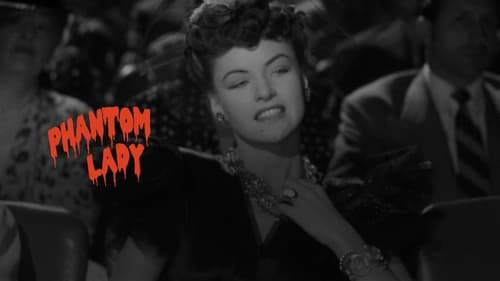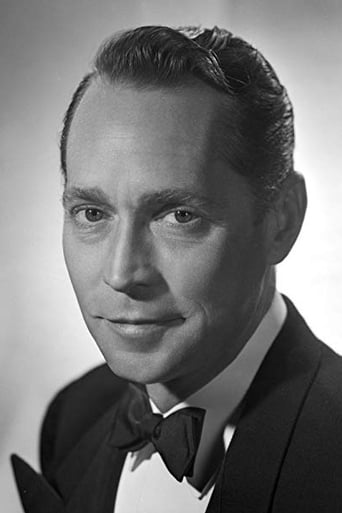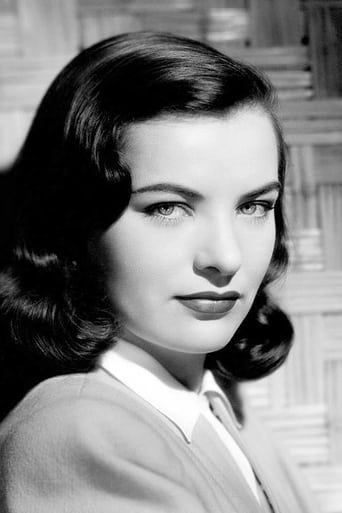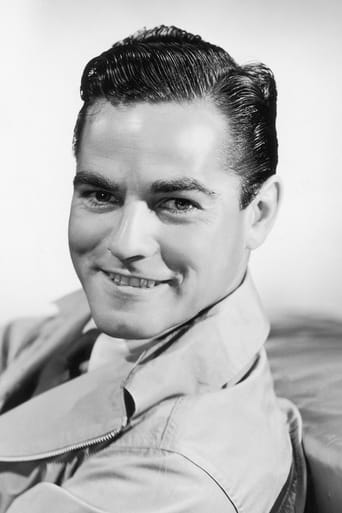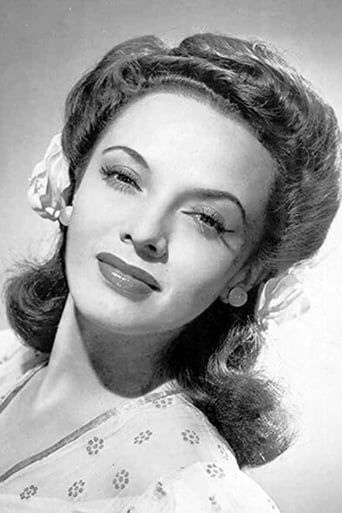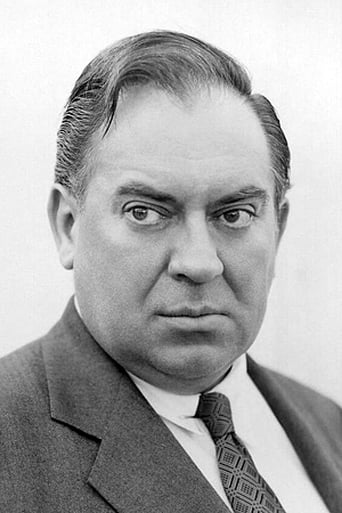Noutions
Good movie, but best of all time? Hardly . . .
Jenna Walter
The film may be flawed, but its message is not.
Derrick Gibbons
An old-fashioned movie made with new-fashioned finesse.
unbrokenmetal
'Phantom Lady' (retitled in my country as 'Witness wanted') is a little gem for anyone who appreciates 1940s film noir. It need not feature any of the big stars (Bogart, Cagney, Laughton, Ladd etc.), because its strengths are its excellent b/w photography and an interesting story that doesn't rely on predictable clichés of the genre. Scott Henderson (Alan Curtis) is arrested for the murder of his wife. He is completely innocent, since he spent the evening at a theater with an unknown woman he invited after he met her at a bar (yes, his marriage has seen better days). But when asked for an alibi, not only that 'phantom lady' has disappeared, also several witnesses deny to have seen him with her. Thus, he's thrown into jail, and only his secretary (Ella Raines) and inspector Burgess (Thomas Gomez) don't give up the investigation. When Marlow (Franchot Tone), an old friend of Henderson, offers his assistance, the investigation is taking up speed, but meanwhile another witness was murdered. How can they defend Henderson without witnesses?What I liked especially about 'Phantom Lady' is that there is no actual hero. Henderson is giving up, sits in his prison cell all day and doesn't show any hope. It's almost like he wants to be imprisoned for something he didn't do. So it's really the secretary who becomes the central character, driving the search for the real murderer. Quite unusual for the times and well worth watching.
robert-temple-1
This is a very good mystery thriller in the film noir mode, directed by the émigré German director Robert Siodmak. It is based on a novel by Cornell Woolrich. The plot may not be entirely original, but it is very effective. Alan Curtis is the leading man. He is little remembered today, partly because he died early at the age of only 43 in 1953, nine years after this film was released. Curtis is unhappily married and goes to a bar (in Manhattan) to have a drink to comfort himself. There he meets a mysterious woman in an outlandish hat, who takes a seat beside him but seems deeply preoccupied with her own troubles. Curtis has two tickets for a hit show to which he had intended to take his wife, but as she refused to go, he offers them to the woman, saying it is a shame for them to go to waste. He ends up taking the woman to the show, but she refuses to give him her name and she remains an enigma. He returns home later to find three policemen waiting for him, and his wife lying in the bedroom, having been strangled to death by one of his own ties while he was out. So we are faced with that favourite plot element of many such films, the need to find the mysterious woman who is the only person who can prove his alibi and prevent him being wrongly executed for the murder of his wife. Meanwhile, some witnesses have been bribed to lie about having seen him with the woman, and this raises sinister doubts as to what is really going on. Curtis's secretary, who secretly loves him, played by Ella Raines, sticks by him and does some detective work after he is arrested. She is determined to prove his innocence. Franchot Tone gives a chilling and convincing performance as a psychopathic killer, and the lines of dialogue given to him when he attempts to justify himself are even more chilling than his performance itself. Woolrich must have known a few crazies personally to get it so accurate. Elisha Cook Jr. has a significant role in the film, and he always lends an air of horrifying authenticity to any film noir, especially when he opens his eyes wide with terror in that special way he had. In this film, he shows that he is a good drummer in a jazz band. This is well worth watching.
rafael105
The wired jazz scene with Elisha Cook banging away at the mad drums is worth the whole movie. Plus, there's Ella Raines, looking lovelier than ever. This movie must have really disturbed 1944 audiences. There's a psycho murdering sculptor with strong hands and a fatal weakness. There's fat nasty policemen who breathe down everyone's necks. There's Aurora Miranda trying to steal sister Carmen's act. There's lots of sweating in the August swelter of New York. There's plenty of bad acting and bad dialogue. But, there are also some really unusual shots of street scenes during the long sequence in which Ella pursues the bartender to his death. Strong stuff, indeed. And, did I mention there's Ella Raines looking lovelier than ever? I think I'm in love.
TheLastDriveIn
Phantom Lady (1944) directed by Robert Siodmak; is as nightmarish and psychologically aromatic as it is penetrating.Phantom Lady is a sadly neglected film noir based on a story by Cornell Woollrich and scripted for the screen by Bernard C. Schoenfeld. Stars Ella Raines as Carol "Kansas" Richman, Franchot Tone as Jack Marlow and Alan Curtis as the leading man Scott Henderson. The film also co stars Thomas Gomez (Key Largo) as perceptive Detective Burgess, the intelligent and compassionate detective who eventually comes around to believe in Scott Henderson's innocence.Phantom Lady utilizes the innocent man theme beautifully. Siodmak's directing creates an often nightmarish realm, the characters float in and out of. The intersectionality of crime melodrama and psychological thriller is framed nicely. Siodmak is a master storyteller who earned an Oscar nomination for The Killers in 1946.Although on the surface you would assume Phantom Lady to be a man in peril film, it actually works as a woman in danger because Carol "Kansas" puts herself in harms way in order to help her boss, whom she's in love with. Fay Helm's mysterious woman has a tragic trajectory herself as a woman who is spiraling into oblivion by mental decline after losing her beloved fiancé.Scott Henderson, spends the night with this anonymous woman he meets in a bar, after having been shunned by his wife for the last time. The woman who is obviously agitated and disturbed by something causing her pain, agrees to take in a show that Scott has tickets for,but the conditions are that they do not exchange names as it's just a way for both of them to keep themselves occupied at a moment when both are broken.The "Phantom Lady" is wearing a sensationally quirky hat which the film revolves around in a sense, because Scott returns home to find his apartment crawling with police after his wife has been brutally strangled, with one of Scott's expensive ties. This woman in a stand out hat is the only key to proving Scott's alibi.Scott proceeds to tell Detective Burgess, that he spent the night with this no name woman, after fighting with his wife and that there are several people who would have seen them together. The bar tender, the cabbie with a very memorable name, and the temperamental lead singer/dancer in the musical review could identify him accompanied by the phantom lady, because of her supposedly original yet quirky hat which the performer was wearing on stage. Aurora shoots daggers at the Phantom Lady for having worn the same design. You could see the fury on her face as she sings her musical number. Aurora played by Estela Monteiro has a melt down once she walks off stage and decrees that no one would have the nerve to wear one of her hats, and throws her own hat away.Detective Burgess takes Scott around to each of these witnesses but no one recalls having seen him with a woman at all. They all very curiously deny seeing the lady, and it becomes obvious that something is very wrong with the testimony from all these people who were obviously covering something up. The outcome looks bleak for Scott, because it appears that Scott is guilty of the crime he is sentence to death and faces the electric chair in 18 days. With no witnesses to back him up.Scott Henderson is a civil engineer in a loveless marriage, with a beautiful associate who works for him, which he affectionately calls Kansas. She never doubts his innocence for a moment and devoutly sets out on a mission to try and find this mysterious lady to prove she really does exist, before it's too late. She also tracks down those whom she knows have lied about seeing this woman.Along the way, Detective Burgess, confronts Kansas in her apartment and tells her that although he did his job at the time, he also believes in Scott's story because a child could make up a better alibi than the story he has stuck to so religiously. So now Kansas and Burgess set about to prove that someone has been tampering with these witnesses.What lies ahead is a very gripping story with several taut and fiery moments. Elisha Cook Jr. is fantastic as the tweaked sleazy drummer who's got an appetite for women in the audience. And Fay Helm is very palpable as the Phantom Lady who alludes the police after that one night at the Broadway show with Scott.The characters are very engaging, and the witnesses are despicable as they are being evasive, which creates an atmosphere of obstruction that is stirring and at times, maddening.Although at the time the film got critical acclaim, I'm surprised it wasn't more popular in the Noir film psyche of reviewers and critics. Today it seems like a forgotten gem amidst some of the more over- treaded Noirs and the popularity they still maintain.Without giving away any key parts of the plot development, I'll say that the film shows us a dark side of humanity. While the film doesn't describe to us why these characters are doing what they do with the use of flashback another Noir staple technique, we see who these people are by their actions. The film explores human nature in a slightly gritty naturalistic style. A nightmarish journey of the wrongly accused, the tragedy of loss, greed and true madness. And ultimately the love that bears its fruits by unrelenting devotion and the pursuit of the truth at any cost.

